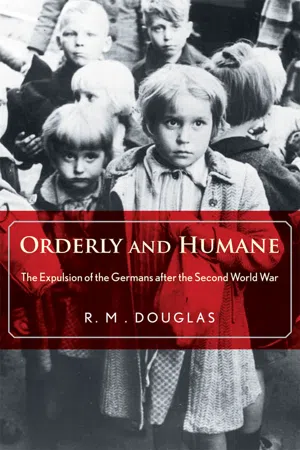![]()
NOTES
INTRODUCTION
1. T. Petersen, Flucht und Vertreibung aus Sicht der deutschen, polnischen und tschechischen Bevölkerung (Bonn: Stiftung Haus der Geschichte der Bundesrepublik Deutschland, 2005), p. 62.
CHAPTER 1. THE PLANNER
1. The Times, October 7, 1938.
2. H. Nicolson, Peacemaking 1919 (Boston: Houghton Mifflin, 1938), p. 279.
3. Quoted in M. J. Heimann, Czechoslovakia: The State that Failed (New Haven, CT: Yale University Press, 2009), p. 47.
4. J. W. Bruegel, Czechoslovakia Before Munich: The German Minority Problem and British Appeasement Policy (Cambridge: Cambridge University Press, 1973), p. 65.
5. R. Jakobson, “Problems of Language in Masaryk’s Writings,” in J. Novák, ed., On Masaryk: Texts in English and German (Amsterdam: Rodipi, 1988), pp. 72–3.
6. R. Vansittart, Manchester Guardian, April 15, 1944.
7. See J. Bradley, “Czechoslovakia: External Crisis and Internal Compromise,” in D. Berg-Schlosser and J. Mitchell, eds., Conditions of Democracy in Europe, 1919–39: Systematic Case Studies (Basingstoke, Hampshire: Palgrave Macmillan, 2000), esp. pp. 90–1.
8. T. Zahra, Kidnapped Souls: National Indifference and the Battle for Children in the Bohemian Lands, 1900–1948 (Ithaca, NY: Cornell University Press, 2008), pp. 107, 121.
9. Z. A. B. Zeman, “Czechoslovakia Between the Wars: Democracy on Trial,” in J. Morison, ed., The Czech and Slovak Experience (New York: St. Martin’s Press, 1992), p. 165.
10. Zahra, Kidnapped Souls, p. 112.
11. Quoted in Bruegel, Czechoslovakia Before Munich, p. 79.
12. Quoted in L. Rothkirchen, The Jews of Bohemia and Moravia: Facing the Holocaust (Lincoln: University of Nebraska Press, 2005), p. 161.
13. For a detailed analysis of the means by which this image was propagated, see A. Orzoff, Battle for the Castle: The Myth of Czechoslovakia in Europe, 1914–1948 (Oxford: Oxford University Press, 2009).
14. “A German Bohemian Deputy,” “National Minorities in Europe: The German Minority in Czechoslovakia,” Slavonic and East European Review 41 (January 1936): 297–8.
15. Heimann, Czechoslovakia, p. 73.
16. U. Völklein, “Mitleid war von niemand zu erwarten”: Das Schicksal der deutschen Vertriebenen (Munich: Droemer, 2005), p. 10.
17. See, e.g., C. Boyer et al., “Die Sudetendeutsche Heimatfront (Partei), 1933–1938: Zur Bestimmung ihres politisch-ideologischen Standortes,” Bohemia 38:2 (1997): 357–385; R. M. Smelser, The Sudeten Problem, 1933–1938: Volkstumspolitik and the Formulation of Nazi Foreign Policy (Middletown, CT: Wesleyan University Press, 1975).
18. M. Cornwall, “‘A Leap into Ice-Cold Water’: The Manoeuvres of the Henlein Movement in Czechoslovakia, 1933–1938,” in M. Cornwall and R. J. W. Evans, eds., Czechoslovakia in a Nationalist and Fascist Europe 1918–1948 (Oxford: Oxford University Press, 2007), p. 141.
19. Heimann, Czechoslovakia, p. 60.
20. See I. Lukes, “Stalin and Czechoslovakia in 1938–39: An Autopsy of a Myth,” in I. Lukes and E. Goldstein, eds., The Munich Crisis, 1938: Prelude to World War II (London: Cass, 1999), pp. 13–47.
21. P. Neville, Hitler and Appeasement: The British Attempt to Prevent the Second World War (London: Hambledon Continuum, 2006), p. 117; speech by Churchill, Parliamentary Debates, Commons, 5th ser., vol. 339, col. 364 (October 5, 1938).
22. Parliamentary Debates, Lords, 5th ser., vol. 110, col. 1306 (October 3, 1938).
23. Heimann, Czechoslovakia, p. 87.
24. Quoted in Z. A. B. Zeman and A. Klimek, The Life of Edvard Beneš, 1884–1948: Czechoslovakia in Peace and War (Oxford: Clarendon Press, 1997), p. 141.
25. M. Hauner, “‘We Must Push Eastwards!’ The Challenges and Dilemmas of President Beneš after Munich,” Journal of Contemporary History 44:4 (October 2009): 619–656.
26. E. Beneš, Odsun Němců: Výbor z pamětí a projevů doplněný ediĉními přílohami (Prague: Spoleĉnost Edvarda Beneše, 1995), pp. 12–13; E. Táborský, “Politics in Exile, 1939–1945,” in V. S. Matamey and R. Luža, eds., A History of the Czechoslovak Republic 1918–1948 (Princeton, NJ: Princeton University Press, 1973), p. 332.
27. M. Hauner, “Introduction,” in E. Beneš, The Fall and Rise of a Nation: Czechoslovakia 1938–1941, ed. M. Hauner (Boulder, CO: East European Monographs, 2004), pp. xxiii–xxiv.
28. F. D. Raška, The Czechoslovak Exile Government in London and the Sudeten German Issue (Prague: Karolinum Press, 2002), p. 46.
29. Quoted in Zeman and Klimek, Life of Edvard Beneš, p. 150.
30. C. Bryant, Prague in Black: Nazi Rule and Czech Nationalism (Cambridge, MA: Harvard University Press, 2007), pp. 98, 102.
31. Quoted in Raška, The Czechoslovak Exile Government in London, p. 44.
32. Quoted in Bryant, Prague in Black, p. 99.
33. D. Reynolds, “Churchill and the British ‘Decision’ to Fight On in 1940: Right Policy, Wrong Reasons,” in R. Langhorne, ed., Diplomacy and Intelligence During the Second World War: Essays in Honour of F. H. Hinsley (Cambridge: Cambridge University Press, 1985), pp. 147–167.
34. Raška, The Czechoslovak Exile Government in London, p. 40.
35. Ibid., p. 51.
36. Ibid., p. 98.
37. E. Beneš, “The New Order in Europe,” Nineteenth Century and After, September 1941, 154.
38. E. Beneš, The War of 1939: Two Addresses of the Czechoslovak President at the Edinburgh and the Glasgow University 5th and 7th November, 1941 (Prague: Spoleĉnost Edvarda Beneše, 2005), p. 28.
39. E. Beneš, “The Organization of Postwar Europe,” Foreign Affairs 20:2 (January 1942): 237–8.
40. Quoted in Zeman and Klimek, Life of Edvard Beneš, p. 183. Emphasis in original.
41. Orzoff, Battle for the Castle, p. 206.
42. R. J. Crampton, Eastern Europe in the Twentieth Century and After (London: Routledge, 1997), pp. 192–3.
43. V. Mastny, The Czechs under Nazi Rule: The Failure of National Resistance, 1939–1942 (New York: Columbia University Press, 1971), p. 215.
44. See, e.g., J. King, Budweisers into Czechs and Germans: A Local History of Bohemian Politics, 1848–1948 (Princeton, NJ: Princeton University Press, ...
